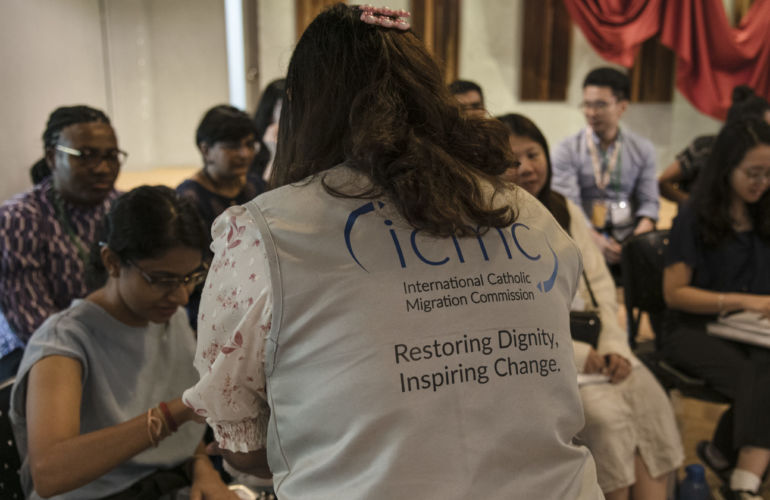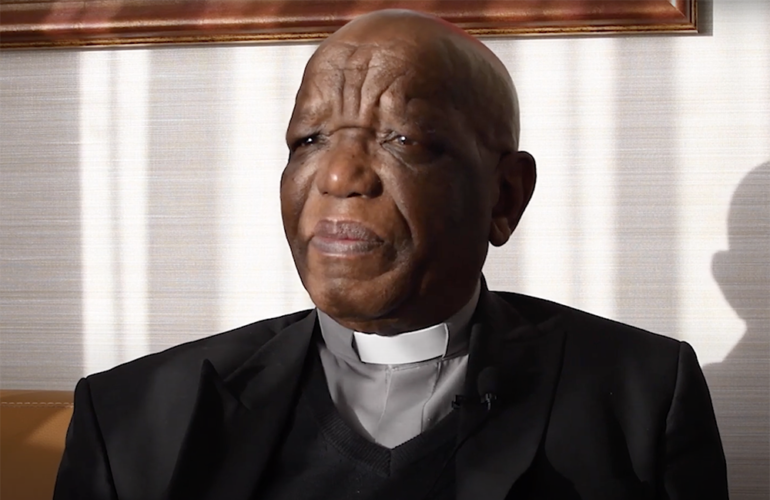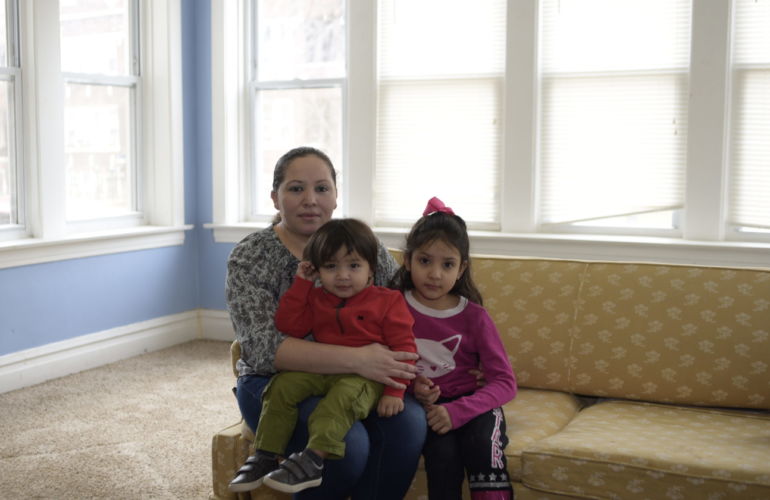ICMC Supports Members to Ensure Access to Education for Displaced Children Around the World
On the occasion of the International Day of Education, celebrated on Friday 24 January, we spotlight how ICMC support has enabled access to education for refugee children and young people in Burkina Faso, Trinidad and Tobago, and the Central African Republic.
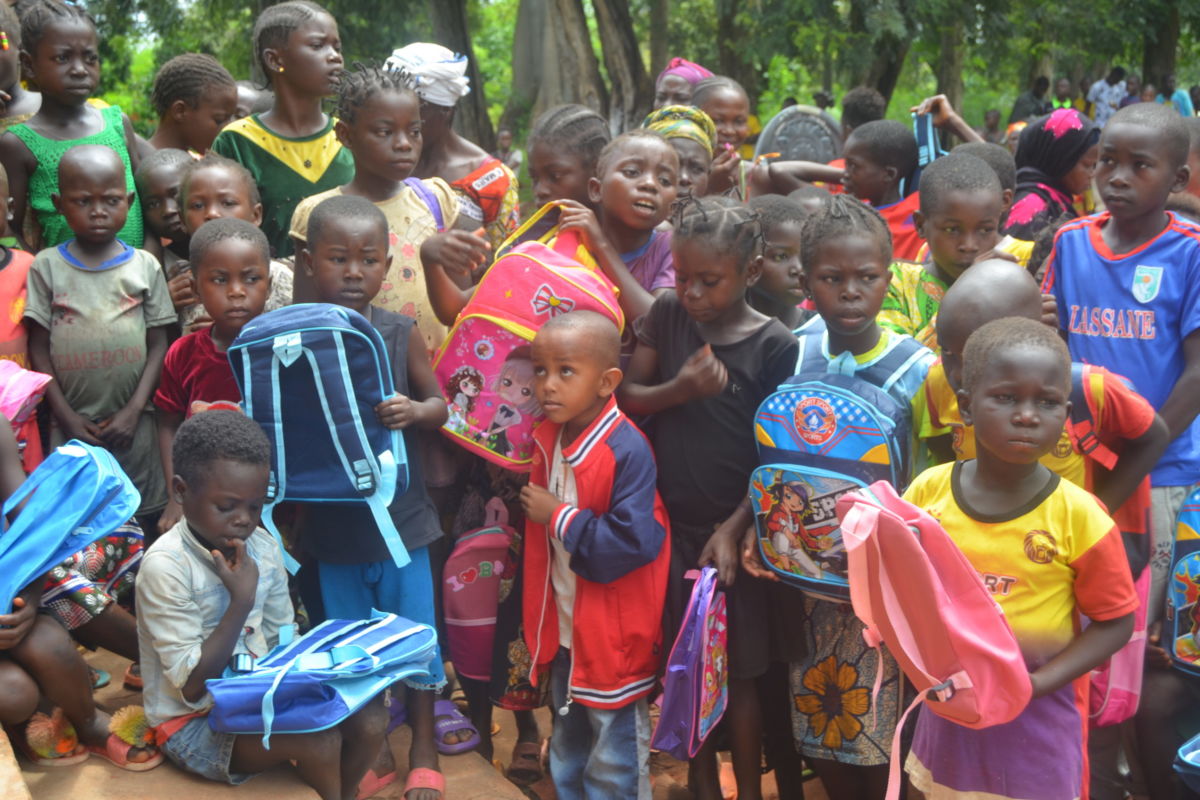
“All children and youth have the right to go to school, regardless of their immigration status. Education is a hope for everyone. Let us pray for migrants, refugees and those affected by war, that their right to an education, which is necessary to build a more human world, might always be respected.”
Pope Francis, January 2025 prayer intention ‘For the Right to An Education’
The United Nations Convention on the Rights of the Child guarantees the right to an education for every child and young person, regardless of their status or circumstances. Yet an estimated 7.2 million displaced children – just under half of all such children around the world – are not enrolled in education.
Displaced Children and Education: Barriers and Benefits
The benefits of education for refugee children are numerous and clear. School provides a place of safety and protection, and a safe and supportive environment in which children can express their feelings and experiences through play and learning. Education also reduces children’s vulnerability to exploitation: if all girls completed primary school, for example, it is estimated that early marriage would decrease by 14%, increasing to 64% if they all finished secondary school. In the longer term, accessing a good quality education leads to increased self-sufficiency and reduced dependency on aid amongst refugee communities.
Displacement creates multiple barriers for children and young people’s access to education. The majority of refugees are concentrated in low and middle income countries, in which resources to meet the educational needs of refugee populations may not be readily available. Stateless children and those without birth certificates or other identity documents may be ineligible to enrol in school or take exams, while some countries entirely exclude asylum-seeking and refugee children from mainstream education.
Refugee children are especially underrepresented at higher levels of school education: for the academic year 2022-23, their enrolment rates stood at 37% for pre-primary, 65% for primary, 42% for secondary, and 7% for tertiary education. The pressure to leave school early can attributed to economic pressures experienced by many displaced families, with children and young people being forced to drop out to find employment. This has specific impacts for displaced girls and young women, with early marriage providing a route to reducing the economic pressures within their family households.
ICMC Supporting Access to Education for Displaced Children
“ICMC pays tribute to the many organizations and individuals around the world working to ensure that refugee children can exercise their right to an education, including those within our worldwide network of member Catholic Bishops Conferences and Catholic-inspired organizations. We pledge our continued support and solidarity in the crucial fight to ensuring every displaced child can play, learn, and pursue a future in safety and with hope.”
From ‘Education: A Pathway of Hope That Opens Doors to a Better Future’,
ICMC’s statement on the occasion of the 2025 International Day of Education.
Providing Education and Protection at Child Friendly Spaces in Burkina Faso
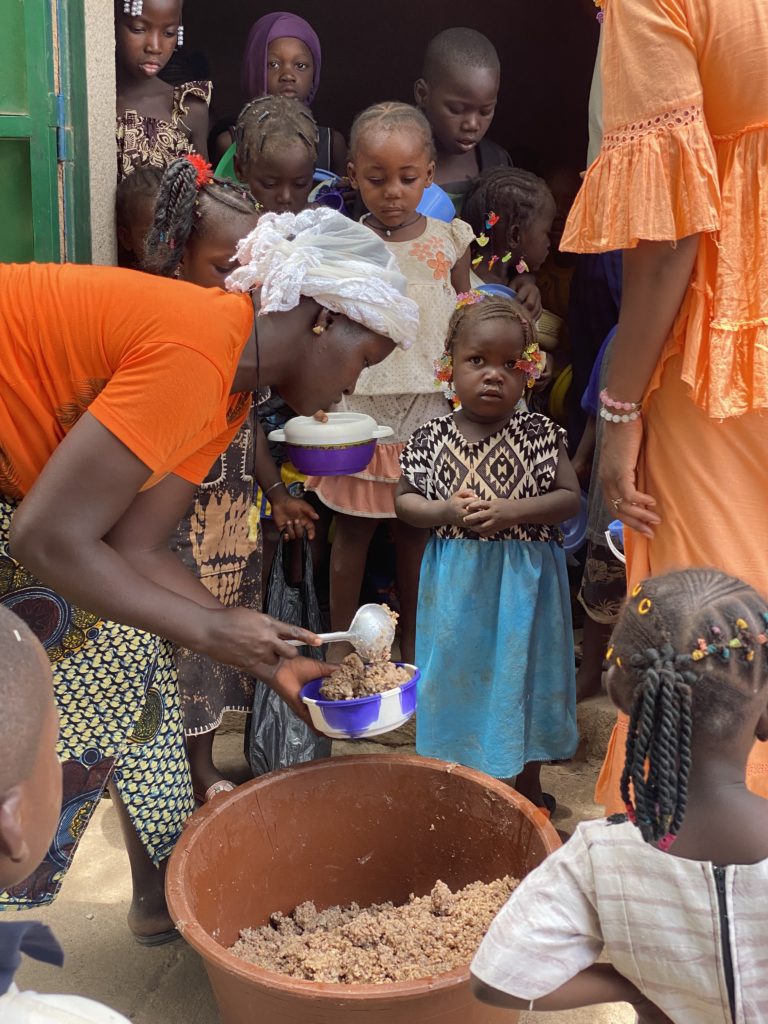
Child Friendly Spaces provide safe and protective environments in which children can participate in play, learning, and recreational activities that support their resilience and wellbeing. In both humanitarian emergencies and protracted refugee situations, Child Friendly Spaces ensure an ongoing connection to learning for displaced children unable to access mainstream education. In Burkina Faso, 2.1 million people have been internally displaced since 2019 due to poverty, inequality, and the growing activities of non-state armed groups. Widespread insecurity and attacks on infrastructure have led to the closure of just under a quarter of all schools, depriving more than one million children of their education, and preventing 31,000 teachers from continuing their work.
Responding to this acute need, ICMC has since 2020 supported our national member, the Episcopal Commission for the Pastoral Care of Migrants and Refugees in Burkina Faso (CEPMR), to provide psychosocial support and education for displaced children aged 3-6 years at three Child Friendly Space (CFS) facilities in the towns of Bourzanga, Karangasso, and Bama. Each year, these facilities introduce an average of 350 children to literacy and mathematics, and facilitated activities to help them develop basic language and locomotor skills. Children also benefit from opportunities to engage in music, play, and arts, while the CFS curriculum includes activities to promote health, hygiene, and civic education. CFS facilities take a holistic approach to supporting families, providing psychosocial assistance for both children and parents, and enabling parents to work and provide for their children in the knowledge that they are being cared for in a safe environment.
Outside of CFS facilities, mobile CFS units visit more remote villages to locate and offer support to additional children. ICMC support also enables CEPMR community mobilizers to facilitate community awareness-raising sessions on the importance of obtaining birth certificates for children, addressing a key barrier for their future access to education.
Ensuring Access to Education for Undocumented Children in Trinidad and Tobago
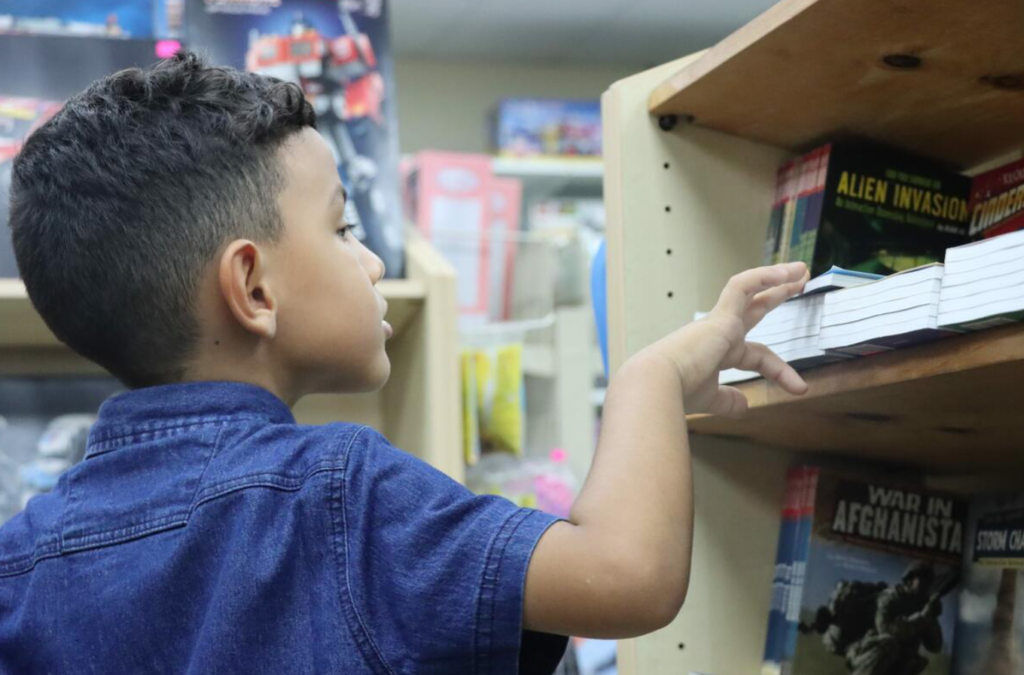
In Trinidad and Tobago approximately 50,000 Venezuelan refugees have arrived by sea since 2020, the vast majority of whom are undocumented.
While the government conducted a national registration exercise in 2019, via which many were granted temporary residency and labor rights, registration permits did not provide access to mainstream education for refugee and migrant children until late 2024. Despite some progress since on enrolling Venezuelan children in school, an estimated 2,000 remain outside of mainstream education.
In 2023, ICMC supported our national member in Trinidad and Tobago, the Archdiocesan Ministry for Migrants and Refugees (AMMR), to implement activities and build capacity at five existing Child Friendly Spaces. ICMC support ensured educational and play materials, basic literacy and numeracy education, and funding for expert facilitators, participant transport, and children’s meals, and the project benefited 400 children aged 5-17 and their families. ICMC support also enabled CFS staff and volunteers to participate in training and capacity-building on migrant backgrounds and vulnerabilities, protection against sexual exploitation/abuse, and gender-based violence.
Supporting a Return to Education for Children and Young People in the Central African Republic
The Central African Republic (CAR) has suffered decades of instability since its independence in 1960. In the most recent crisis affecting the country, a violent seizure of power in 2013 led to widespread fighting between government forces and armed groups, perpetuating a pattern of sporadic violence that has now been ongoing for more than two decades.
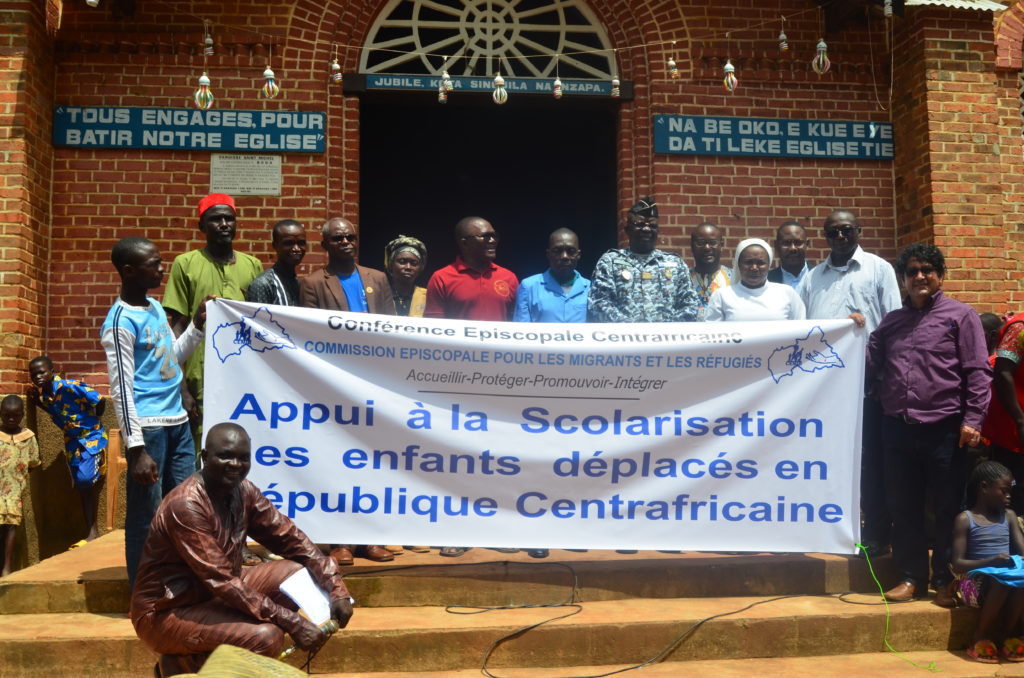
Insecurity and the effects of climate change, notably flooding, continue to drive displacement in CAR. Just under 470,000 people are internally displaced, and 2.8 million are in need of humanitarian assistance (among them 1.2 million children). The impact on the education sector has been catastrophic, with many schools damaged or destroyed, and expected years of schooling standing at just 5.3 for boys and 3.8 for girls. The impact is particularly acute for girls, with factors such as child marriage, early pregnancy, and the need to travel long distances to school meaning just 38% of young women reach secondary school.
During 2023-24, ICMC support enabled our member in CAR, the Episcopal Commission for Migrants and Refugees (CEMIR), to implement a 12-month program to re-engage 200 children aged 5-15 in pre-school and primary education. Drawn from displaced, returnee, and host communities in the affected localities of Bangui, Mbaïki, Galafondo, and Carnot, the program provided re-enrolled children with financial support for school fees, uniforms, and equipment.
A lack of qualified schoolteachers in CAR presents an additional obstacle to effective schooling for displaced children. To address the lack of teacher training available in the country, from late 2023 ICMC supported CEMIR to implement a nine-month training program for 80 teachers working in schools receiving displaced children. The program included modules based on CEMIR’s assessment of teacher training needs in participating schools, covering language, literacy, psychosocial support, arts and sports education, and child safeguarding.
Reintegrating Children Formerly Associated With Armed Groups in the Central African Republic
Amongst those returning to their homes in CAR after periods of displacement are more than many thousands of children formerly associated with armed forces and groups, formally or informally released since 2014, at least 30% of whom are girls. This group faces severe and specific reintegration challenges, including social exclusion caused by stigmatization and rejection. A lack of effective reintegration assistance for this group risks negative long-term effects for them, their communities, and wider peace and development gains.
During 2023-24, ICMC supported enabled CEMIR to assist 40 such children and young people in three provinces to access literacy and numeracy education, and subsequent vocational training in areas including mechanics, carpentry, welding, and sewing. More than half of the 20 participating girls were heads of households living without family support, and access to education and training provided them with an alternative to providing for their families via prostitution.
***
Find out more about the 2025 International Day of Education.
Read Education: A Pathway of Hope That Opens Doors to a Better Future, ICMC’s statement on the occasion of the 2025 International Day of Education.

Rachel Westerby
Independent writer and researcher on migration, refugees, and human rights.


